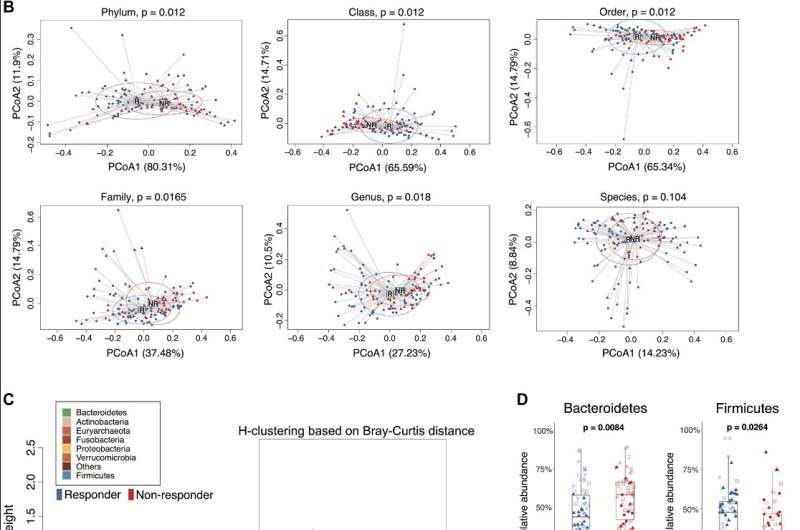Comparisons of gut microbiome between responders and non-responders from the combined dataset. Credit: Liang et al, Oncotarget (2022). DOI: 10.18632/oncotarget.28252
A new research paper was published in Oncotarget on July 19, 2022, titled "Predicting cancer immunotherapy response from gut microbiomes using machine learning models."
Cancer immunotherapy has significantly improved patient survival. Yet half of patients do not respond to immunotherapy. Gut microbiomes have been linked to clinical responsiveness of melanoma patients on immunotherapies; however, different taxa have been associated with response status with implicated taxa inconsistent between studies.
In this new study, by Hai Liang and colleagues from the National Institutes of Health Library, National Cancer Institute, National Human Genome Research Institute, West Virginia University, Zimmerman Associates Inc., and the University of Pittsburgh, researchers used a tumor-agnostic approach to find common gut microbiome features of response among immunotherapy patients with different advanced stage cancers.
The research team explains, "Using the combined dataset, we trained and validated models with machine learning algorithms to predict patients' clinical responses, followed by cross-sequencing-platform validation using shotgun metagenomic sequencing data."
A combined meta-analysis of 16S rRNA gene sequencing data from a mixed tumor cohort and three published immunotherapy gut microbiome datasets from different melanoma patient cohorts found certain gut bacterial taxa correlated with immunotherapy response status regardless of tumor type.
Using multivariate selbal analysis, the researchers identified two separate groups of bacterial genera associated with responders versus non-responders. Statistical models of gut microbiome community features showed robust prediction accuracy of immunotherapy response in amplicon sequencing datasets and in cross-sequencing platform validation with shotgun metagenomic datasets.
Results suggest baseline gut microbiome features may be predictive of clinical outcomes in oncology patients on immunotherapies, and some of these features may be generalizable across different tumor types, patient cohorts, and sequencing platforms. Findings demonstrate how machine learning models can reveal microbiome-immunotherapy interactions that may ultimately improve cancer patient outcomes.
"In conclusion, analyses of our cohort and the combined microbiome dataset have provided a robust assessment of immunotherapy patients' gut microbiomes. The development of reliable models provides additional opportunity to distinguish and predict immunotherapy responders from non-responders. However, the interactions between key microbial taxa and host immunity still need to be elucidated. Ultimately, this research will assist in identifying microbial biomarkers or novel therapeutic targets to improve immunotherapy outcomes and the overall survival of cancer patients," the researchers said.
More information: Hai Liang et al, Predicting cancer immunotherapy response from gut microbiomes using machine learning models, Oncotarget (2022). DOI: 10.18632/oncotarget.28252
Journal information: Oncotarget
Provided by Impact Journals LLC
























